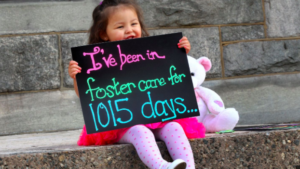Deportation, Detention & Foster Care by Nicole Simonson, LICSW
Over the past several years, especially since January 2017, executive orders that provide for significant expansion of efforts prioritizing the deportation of all undocumented people in the United States have been issued. Currently, there are more than five million children in this country living with at least one undocumented parent. Unfortunately, there aren’t any protections in place to preserve family units when an undocumented parent is deported, which often leads to children being funneled into the child welfare system. The last major report on this issue, which came out in 2011, estimates that around 5,000 citizen children were in foster care as the result of an undocumented parent’s deportation.
Children who live in the United States with undocumented parents begin at a disadvantage and face risk factors  that are pervasive and “occur along several educational, linguistic, economic and socio-emotional lines.” Deportation of a parent and subsequent placement into foster care only compounds risk factors by causing significant loss, possible trauma and a variety of complications. Children who enter foster care are more likely to have behavioral and emotional problems than children living with both parents or with a single parent. They are also more likely to have poor academic performance and to suffer the effects of this later in life with more difficulty finding employment.
that are pervasive and “occur along several educational, linguistic, economic and socio-emotional lines.” Deportation of a parent and subsequent placement into foster care only compounds risk factors by causing significant loss, possible trauma and a variety of complications. Children who enter foster care are more likely to have behavioral and emotional problems than children living with both parents or with a single parent. They are also more likely to have poor academic performance and to suffer the effects of this later in life with more difficulty finding employment.
In Massachusetts, it is not uncommon for a child in foster care to change homes and schools within a short period of time. One child I previously worked with changed homes, and therefore caregivers, towns, and schools, three times by the time she was six years old. For a child who loses a parent, each separation from a new caregiver has the potential to re-traumatize that child, leading to a host of possible problems, including a spike in anxiety and other mental health symptoms, increased difficult behaviors at school and at home, and a decrease in the child’s ability to learn due to the aforementioned issues. When a child can’t focus in school and/or exhibits significant and disruptive behaviors in the classroom, they are more likely to end up receiving special education services which can include being moved to more restrictive environments and away from friends. For all too many children, this can become a vicious cycle of loss, and too often the development of a poor sense of self, based on a lack of success, both academically and socially, that is not their fault. We need to stop setting American children up for failure; we need to discontinue the traumatizing practice of separating any child from an undocumented parent.

